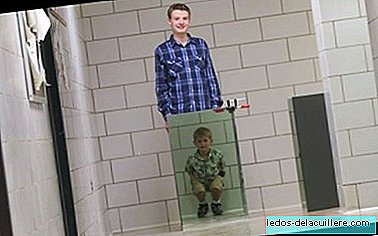
We have seen that there are many possible causes for which a baby can reject the breast, and in this issue we will go into the possible solutions that we can adopt to solve it.
What can we do if the baby rejects the breast?
We cannot always detect the cause of rejection by the mothers themselves, especially if we have little experience in previous breastfeeding and an unfamiliar environment female breastfeeding art.
If once we have tried the most common strategies, which we will see later, there are resources to turn to. The pediatrician or midwife should be able to guide us, but, if this does not happen, there are breastfeeding support groups in many cities in Spain, in which women who have breastfed or are doing so can advise us.
In these groups, in addition, there are usually lactation consultants with specific training and extensive experience, which sometimes even attend by telephone. For me they were vital to maintain breastfeeding.
Internationally certified lactation consultants (IBCLC) are professionals that we can turn to for help and guidance and may even advise other specialists and even physical therapy in some specific cases.
General strategies
There are some simple things we can do to try to solve, apart from those already mentioned in specific cases, the specific problems of breastfeeding rejection. With them we will try to create an environment and optimal circumstances to maintain breastfeeding, reassure the baby and not decrease production.
The mother must take care of herself and ask to be taken care of. Being rested, well fed and hydrated is very important. When we go to breastfeed we should have a bottle with water nearby, so that we can drink if we are thirsty, which is quite common in the middle of the afternoon.
It is extremely important to try stay relaxed. Obviously, if the baby rejects the breast it is normal for the parents to feel under a lot of tension, so relaxing is important, so much that a situation of excessive stress can cause the production to decrease temporarily. We will see later that, above all, it is vital that the child receives sufficient food, from the breast, from extracted milk or, ultimately, with artificial feeding. Your health and food must be kept safe while we solve the crisis and that also helps us to be calmer.
If there is a crisis in breastfeeding, the mother usually needs to focus on that and the other obligations distract her, overwhelm her and take away the time she needs to work her breastfeeding. We must ask for help or hire it, whenever possible, both to do the housework and to cover the moments in which we feel that we can not attend one hundred percent to older children.
Concrete strategies that help improve breastfeeding
To improve breastfeeding it is necessary to focus on offer chest freely to the baby, not regulating the schedules or duration of the shots, letting me breast when and how much he wants, to real free demand.
But you never have to force the baby to breastfeed. In fact, making a baby suck against his will is not possible, but if it happens that, worried, the mother insists and insists until the anger of the child increases, increasing his rejection. That is, free demand, no insistent offer.
Must study the position from the baby to the breast, seeking advice if we have any doubts, for which breastfeeding groups and consultants can be very useful if there are no trusted mothers in the environment who have extensive experience in breastfeeding. Our pediatrician and our midwife have the necessary theoretical knowledge, but not always the direct experience and especially the necessary time to be present in one or several teats to verify that there is no defective posture. And it is that to detect that the baby does not grab correctly it is necessary to see more than the few minutes that they usually have in the consultations.
The usual posture, with the baby lying in front of the mother's belly and with the halo inside the mouth is not enough indication. There are other feasible formulas that can help us and, whenever we verify a correct grip, it is convenient to let ourselves be guided by the child, who will choose a comfortable posture for himself, especially those who already have control over his neck and head.
Respect the child It's very important. There are children who are disturbed and distracted by noise, visits and noise. In the crisis, we must especially look for the environment that is best for the child and if it is necessary to retire to breastfeed in a space where the interruptions are less if we perceive that the child is breastfeeding better.
Conclusion
If our baby rejects the chest We can try to find simple strategies to improve our posture and relax tension and help both of us to recover breastfeeding fluidity. However, in addition to those cited in this topic, there are other more general ones, valid for any mother, breastfeeding with or without problems or artificial breastfeeding, which are valid in all cases to improve the connection with the child.












